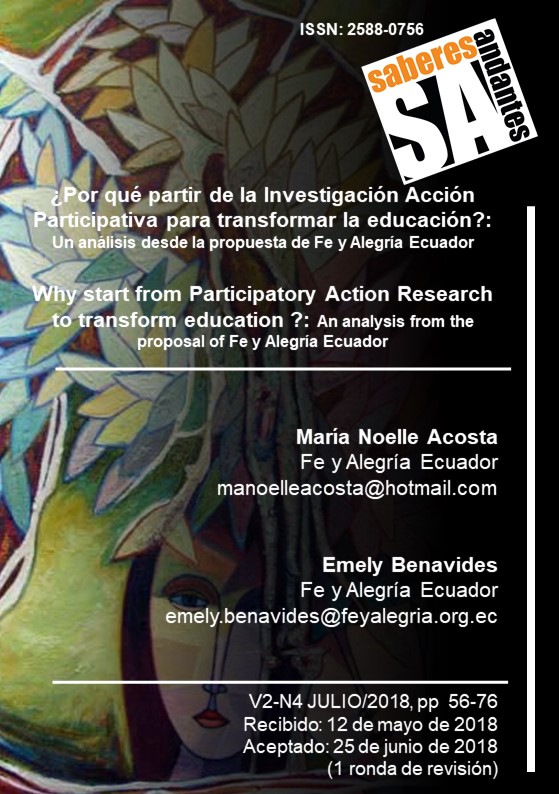Why start from participatory action research to transform education?
An analysis from the proposal of Fe y Alegría Ecuador
DOI:
https://doi.org/10.53387/sa.v2i4.30Keywords:
participatory action research, transformation, educators, researchers, criticai thinking, collective constructionAbstract
This article focuses on the importance of Participatory Action Research (PAR) in the educational sphere and its convergence with Popular Education, while both pursue social transformation from the development of a criticai consciousness. lt proposes a way of conceiving research committed to social change and, consequently, those who assume the challenge of adopting it are called to action. This is how PAR constantly brings the challenge of demystifying the assumption that it is not possible to upset formal education as it has been conceived. From the process undertaken by the Training and Research Center (TRC) of Fe y Alegria Ecuador, we seek to give an insight on a possible way to provoke in educators their wish to be assumed as committed agents to reinvent creatively and critically the educational process.
Downloads
References
Ander-Egg, E. (2003). Repensando la Investigación-Acción-Participativa. Lumen Humanitas.
Camacho, G. (2014). La violencia de género contra las mujeres en el Ecuador: Análisis de los resultados de la Encuesta Nacional sobre Relaciones Familiares y Violencia de Género contra las Mujeres. Quito: Consejo Nacional para la Igualdad de Genero.
Corrales, O., & Jimenez, M. d. (s.f.). El docente como investigador. Revista Educacion , 73-79.
Durston, J., & Miranda, F. (2002). Experiencias y metodología de la investigación participativa. Santiago de Chile: CEPAL.
Fe y Alegría. (2016). Horizonte Pedagógico Pastoral Fe y Alegría Ecuador. Quito.
Freire, P. (2012). Pedagogía del oprimido. Madrid: Siglo XXI de España Editores.
Gyssels, S. (2011). Planificar para el cambio. Bogotá. Kutz, C. (1992). Teacher Research: Myths and Realities.
Lewin, K., Stavenhagen, R., Fals Borda, O., Zamosc, L., Kemmis, S., & Rahman, A. (1992). La investigación-acción participativa: Inicios y desarrollo. Madrid:
Editorial Popular .
Ortiz, M., & Borjas, B. (2008). La Investigación Acción Participativa: aporte de Fals Borda a la educación popular. Espacio Abierto, 615-627.
Pérez, A. (1997). Más y mejor educación para todos. Maracaibo.

Downloads
Published
How to Cite
Issue
Section
License
Copyright (c) 2018 Saberes Andantes

This work is licensed under a Creative Commons Attribution-NonCommercial-ShareAlike 4.0 International License.
1. Derechos de autor
Las obras que se publican en Saberes Andantes están sujetas a los siguientes términos:
1.1. Saberes Andantes, conserva los derechos patrimoniales (copyright) de las obras publicadas, favorece y permite la reutilización de las mismas bajo la licencia Licencia Creative Commons 4.0 de Reconocimiento-NoComercial-CompartirIgual 4.0, por lo cual se pueden copiar, usar, difundir, transmitir y exponer públicamente, siempre que:
1.1.a. Se cite la autoría y fuente original de su publicación (revista, editorial, URL).
1.1.b. No se usen para fines comerciales u onerosos.
1.1.c. Se mencione la existencia y especificaciones de esta licencia de uso.








